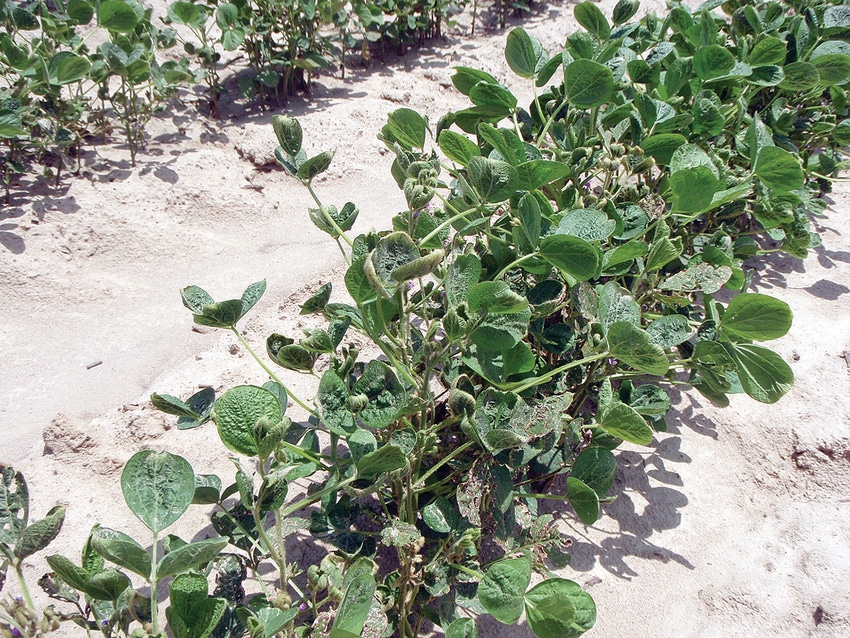
Shortly after the dicamba drift situation blew up across much of the Mid-South last year, calls for increased fines for illegal spraying of the herbicide picked up volume. Increased fines, say proponents, would make those planning more illegal over-the-top applications of dicamba less likely to follow through.
But now, with planting season nearly upon the Delta, sand is quickly running through the hourglass. Is there time to get the increased fines in place?
Where do things stand in Arkansas? On Feb. 28, House Bill 1692 and Senate Bill 501 were filed in the legislature. Both bills would allow fines of up to $25,000 for “egregious” herbicide application violations. Currently, the state’s maximum civil penalty is $1,000 and has been in place since the late 1940s.
One major difference between the two is the Senate Bill 501 specifically mentions dicamba and related products. House Bill 1692 would allow the increased fines for application violations using any herbicide.
The bills address how the fines would be divvied up among state agriculture-related programs. Fines amounting to $1,000 would go to Plant Board scholarship programs. For heftier fines, the scholarship fund would get the first $1,000 along with 60 percent of the remaining fine. The other 40 percent would be shared between the Arkansas Department of Agriculture (for training and education) and the University of Arkansas for the Extension service.
Pathway
“We’re trying to work with the bill sponsors in the House and Senate to see if we can find a logical, common sense path to advance something that can become law,” says Andrew Grobmyer, Executive Vice President, Agricultural Council of Arkansas. “I think everyone agrees we need to have some enforcement mechanism beyond what’s currently in place to deter bad behavior. At the same time, we want to make sure it’s tailored well enough to both serve as a deterrent and also to be functional at the Plant Board once approved.
The question, says Grobmyer, “is can we find a consensus that would allow a bill to get through both the House and Senate? Everyone has their own solutions and we need to find a common one. We’re deep into the legislative session and the filing deadline is coming on. Luckily, bills have been filed to work with but we’re a ways away from everyone getting on the same page, I think.”
The ultimate goal “is to make sure the technology has efficacy for as long as possible. If it’s abused, there’s a chance the technology will be taken away and for resistance to build up in the weeds.”
A tall order
With warm spring weather and producers itching to crank up planters, the impetus to move on the increased fines would seem to be strong.
“We need penalty options with more bite,” says Otis Howe, chairman of the Arkansas Plant Board. “But it’s going to be a tall order to get those in place for this year. Assuming the bills pass, they still have to be reconciled. If that happens, the legislation will come back to the Plant Board and each committee will have to decide how they want to use the increased civil penalties and parameters. Once that’s done, it’ll go to the full Plant Board, to the governor for approval, to public hearing.
“If we get the legislation, we’ll certainly try. At this late date, it can still be done but it’d require a serious sprint.”
The time crunch should come as no surprise. Howe has repeatedly warned that time will be needed to get through the review and approval process once legislation is passed by state lawmakers.
“If that legislation comes out of the next session, the Plant Board will have to go back and each committee will decide if they want to change their penalty matrix to incorporate a higher civil penalty for violations,” Howe said in early January before the current legislative session. “If they do, how much? Then, we’d have to take any proposed civil penalty change through the rule-making process to include a public hearing, a review by the governor and a review by the Legislative Council. Each proposed penalty matrix change would have to go through the whole rule-making process. That’s fine and it’s the way it’s supposed to work – there are probably some committees that won’t want to raise civil penalty amounts to be assessed for a violation.”
About the Author(s)
You May Also Like




